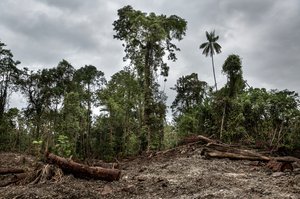For years, our investigations have delved deep into the money driving deforestation. We’ve reported the deals behind tainted palm oil production in Papua New Guinea, the bankers backing rubber plantations destroying the Congo Basin, and the cash that enables cattle ranchers to raze the Brazilian Amazon.

The sums involved are eye-watering. Financial
institutions without a single “zero deforestation”
policy
invested $3.6 trillion in forest-risk companies last year alone, according to
Global Canopy.
Many of the financiers we regularly name in our reports have hidden behind voluntary pledges to end deforestation at some point or another. For example, we recently showed that asset managers and owners belonging to the Glasgow Financial Alliance for Net Zero (GFANZ) have barely reduced their deforestation exposure since pledging to reach net zero by 2050.
GFANZ members have been warned that hitting net zero will not be possible without an end to deforestation, but institutions like BlackRock, Vanguard, State Street and Deutsche Bank actually increased their investment in businesses with links to deforestation between COP26 and COP27.
Mind the accountability gap
At the same time, the existence of these voluntary pledges shows that financial institutions are alive to the risk posed by deforestation and believe it can be eliminated.
At COP26, more than 30 financial institutions managing more than $8.9 trillion dollars established the Finance Sector Deforestation Action Initiative (FSDA), agreeing to use “best efforts” to eliminate agriculture-driven deforestation from their investment and lending portfolios by 2025.
Almost a year later, the FSDA issued shared investor expectations, encouraging companies to publicly disclose information on their traceability systems – including what percentage of their commodity production is completely unassessed for deforestation risk.
Alongside widely available open source information about deforestation, this shows that financial institutions can request additional types of data to effectively conduct due diligence.
Now, financial leaders need to stop hiding behind the insufficient data argument and begin actively backing calls for mandatory due diligence. In doing so, the members of these schemes would demonstrate they are serious about ending the same accountability gap that has been the fatal flaw of similar commitments in the past.
In theory, financial leaders should be shouting their support for due diligence laws from the hilltops. They have a lot to gain from the laws necessary to transform their deforestation pledges from a potential greenwashing scandal into a reality.
Those most heavily invested in deforestation face a ticking time bomb, with global agribusinesses set to lose an average of 7% in value by 2030 due to unpriced climate and nature risk.
Some within the sector are already recognising their public role. Former Barclays chair Sir Ian Cheshire recently wrote to the UK Government to advocate for regulations on investments tied to deforestation. In November 2022, Triodos Bank and other signatories with more than €177 billion under management called for the EU to regulate the financial sector in the then-unfinalised proposal for a regulation on deforestation-free products.
It’s vital that others within the industry do the same. And they must do it now.
In 2023, financial leaders can speak up for change in three key cases:
1. In the EU, the ink has barely dried on a new deforestation-free supply chain regulation, but the European Commission has kicked off a two-year impact assessment exploring the extension of mandatory due diligence obligations to financial institutions. European banks must speak with one voice and show their support for this vital regulatory change.
2. In the UK, the House of Lords will soon vote on the Financial Services and Markets Bill, which could ensure British financiers implement checks to stop deforestation driven by their investments and lending. Banks should step out of the shadows to back this proposal.
3. In the US, where President Biden is considering a whole-of-government response to global deforestation, financial institutions should throw themselves behind their inclusion in the FOREST Act. The US could learn much from the EU’s convoluted two-step process by imposing a due diligence requirement on financial actors from the outset.
Finally, at COP26, China joined the Glasgow Leaders’ Declaration pledge to end deforestation by 2030. A set of guidelines issued last year by the Chinese banking regulator has set out how banks are expected to identify, monitor, prevent and control their environmental, social and governance risks. Chinese entities can prioritise deforestation finance in the way they apply this guidance.
We are facing a pivotal moment for the world’s forests, as the Amazon approaches an irreversible tipping point. Parts of the Bolivian and Brazilian Amazon are already turning into savannah. Deforestation in these regions is not only catastrophic for our climate, but also for the thousands of people who call the Amazon home.
By staying silent, even the most progressive of financial leaders give life to the argument that mandatory due diligence will not work. This year, we need to see a coherent campaign of public support for new regulations.


